
When you're picking out a new external door, you'll quickly start spotting 'composite door' styles. But you might not know exactly what that is.
In this post, we’ll explain what composite doors are made of, highlight their many benefits and uncover their downsides to help you decide whether a composite door is right for you and your home.
Composite doors are made of a combination of materials. This is where their name comes from - they are a 'composite' of various other materials.
The exact make-up of a composite door will vary across manufacturers but it usually includes a solid timber core, as well as skin made from glass reinforced plastic (fibreglass). uPVC, foam and laminate can all be used in a composite door too.
Most composite doors have a solid timber core which makes them strong, durable and excellent insulators. These are all benefits you can expect from a timber door too, however composite doors have one big benefit over wood - that is the durability of their skin.
Usually made of a mix of uPVC or glass reinforced plastic, this skin is lain over the timber core to protect it from the elements. It is difficult to damage, waterproof and low maintenance making it the ideal surface for an external door.
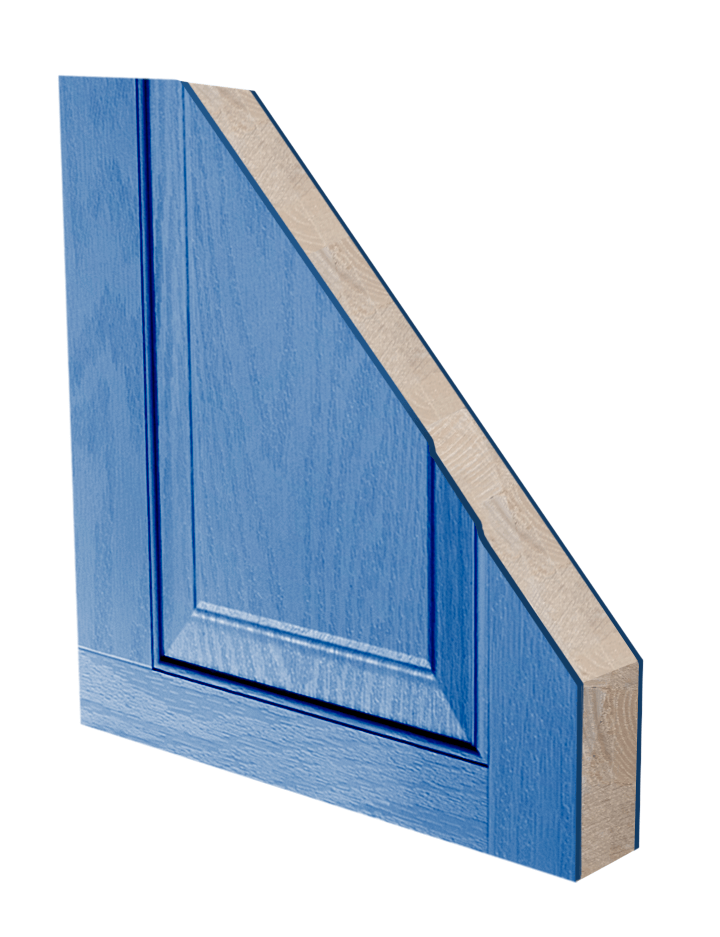
Composite doors bring a lot of practical benefits to your home including:
Thermal Efficiency
High Security
Low Maintenance
Durability
They also bring one other major benefit, which is that they look fantastic. The hard-wearing GRP skin that covers a composite door is patterned with wood grain to give the classic look of a traditional timber door. However, the combination of materials used in composite door styles is much more resilient than wood, so you get to keep that beautiful look for longer.
As well as being attractive in themselves, composite doors are incredibly flexible so they are available in a wide range of styles and designs, as well as an extensive choice of colours. From brilliant pillar box reds and royal blues through to subtle but sophisticated anthracite greys and ebony, the colour range is almost unlimited.
The style and design of modern composite doors are equally wide. They are available as solid designs or with glazed panels - glass options include decorative, plain or frosted panels. You can choose between a modern style with stacked glazing panels, or even a more traditional door design such as a solid stable or barn-style composite front door.
When finding the perfect door for your front door, kerb appeal is often high on your priority list. It can be difficult stamping some originality or striking visuals on the exterior of your home, but a smart, eye-catching front door is a guaranteed way to help your home stand out.
The versatility and variety of choice among composite front doors explain why they are so popular. However, they are also an impressively practical choice.
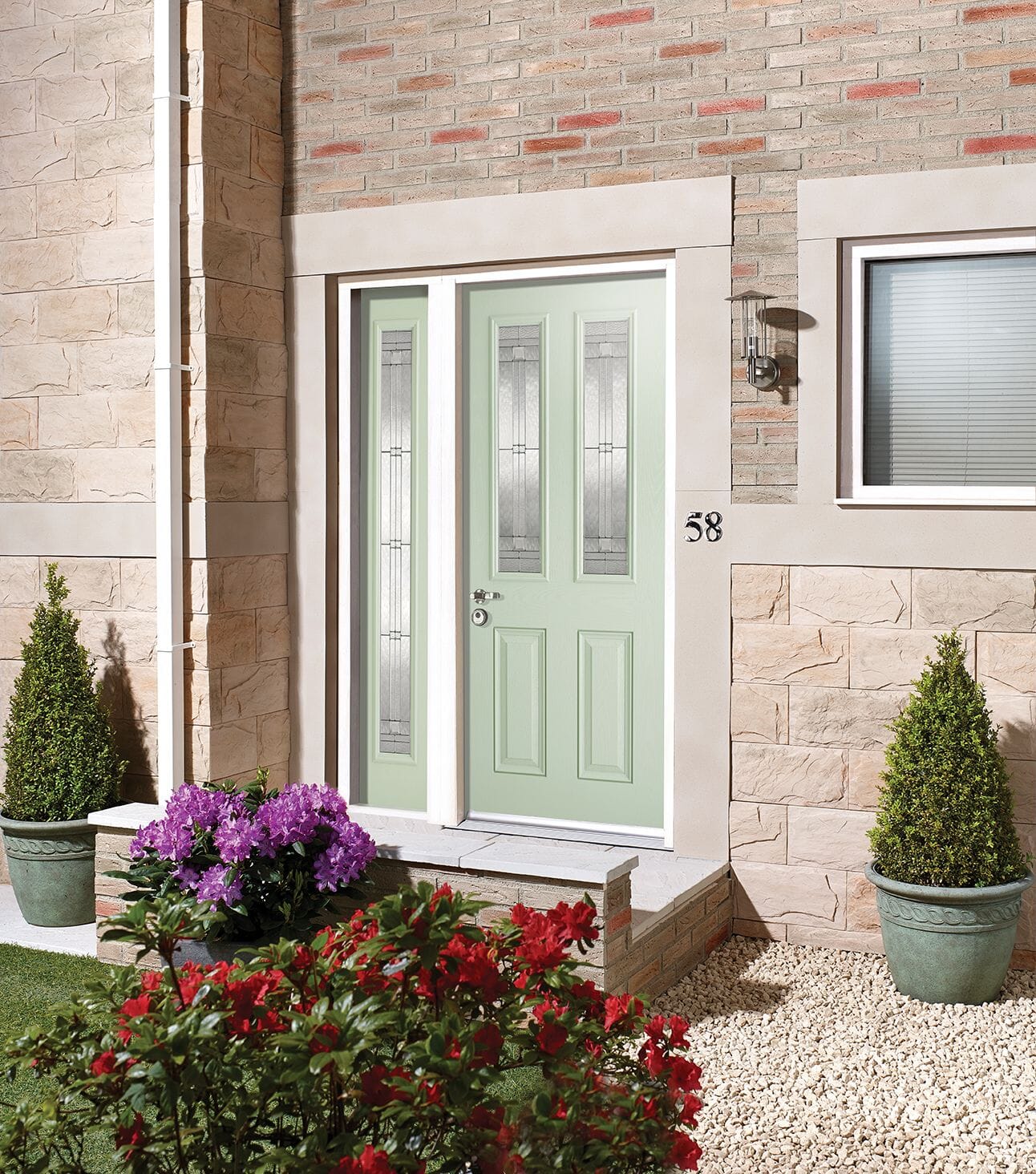
A big tick in the practical benefits of composite doors is how low maintenance they are. In particular, the skin of a GRP composite door is almost entirely weather resistant and is unlikely to need much more than a regular clean throughout its lifetime.
The one bit of maintenance you should carry out on your composite door is to check the weather stripping around its edges. The strips are quick, cheap and easy to replace but if they start to fail you might notice your door getting seriously draughty. It may even start to let water in. It is definitely worth keeping an eye on them and replacing them when you start to spot issues.
The average lifespan of a composite door is around 30 years. This is impressive for any external door, but particularly impressive when you think about how low maintenance a composite front door is.
Your composite door's exact lifespan will depend on a couple of factors including door quality, use and location (the ravages of coastal air will shorten the life of any door, while a door that is subject to regular heavy impacts is likely to suffer too.) But for an average family home, you can expect around 30 years from your door with only a little visual change.
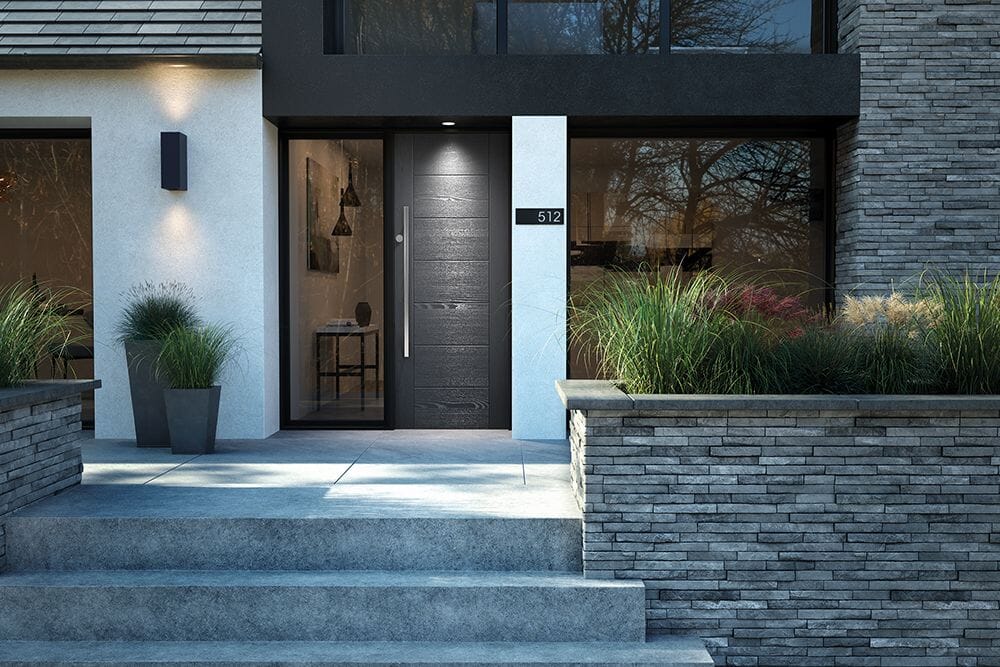
If you want to keep your energy bills down, a composite door is a great choice because they are incredibly energy efficient. These doors are built to retain heat brilliantly, with their solid wood core and insulating materials in their skins.
That said, the exact energy rating of a particular composite door will depend on the door quality, as well as its design. A composite door with a lot of glazing will be less thermally efficient than a solid one, though using double (or even triple) glazed glass will help bump up the performance.
When paying out for a composite door, it is definitely worth making sure any glazing panels are double-glazed to meet the efficiency of the door.

The plastic skin that sits over composite doors lets them stay completely resistant to water. This means no water is able to penetrate the surface of the doors to make them warp or swell.
In contrast, wooden doors lose their weatherproofing qualities over time. In turn, they will start to absorb water and moisture which makes them warp, swell and even crack. To avoid this, you need to refinish your timber doors every couple of years with another few layers of paint, oil or varnish.
With a composite door, you have none of these worries. That robust GRP skin needs no maintenance or refinishing unless it is severely damaged.
Composite doors should always be easy to open. Even though their weight and durability may make them sound heavy, a composite door with well-maintained hinges and locks should stay both secure and easy to open for the entire duration of its life.
If your door does become difficult to open, it will likely be the result of damage.
When it comes to breaking into a composite front door, the door will pose a serious challenge. In fact, equip a high-quality composite front door with a secure locking system and you will get one of the most secure doors available on the market.
The solid timber core makes composite doors an excellent security choice as the core is functionally impossible to break through from impact.
There are certain additions you can make to composite front doors for added security as well. A multi-point lock is an essential security addition, that is required by to meet the building regulations on security. You can also get a door frame with steel reinforcement to prevent break-ins, though this is generally only necessary with a uPVC door.
If you have glazed panels in your door this can affect the overall security of external doors, as glass is much weaker than timber and other composite door materials. Make sure to get laminated glass for maximum security, or toughened glass. If you also keep the panels relatively small, you can enjoy all the light-giving benefits of glazed doors without worrying about compromising security.
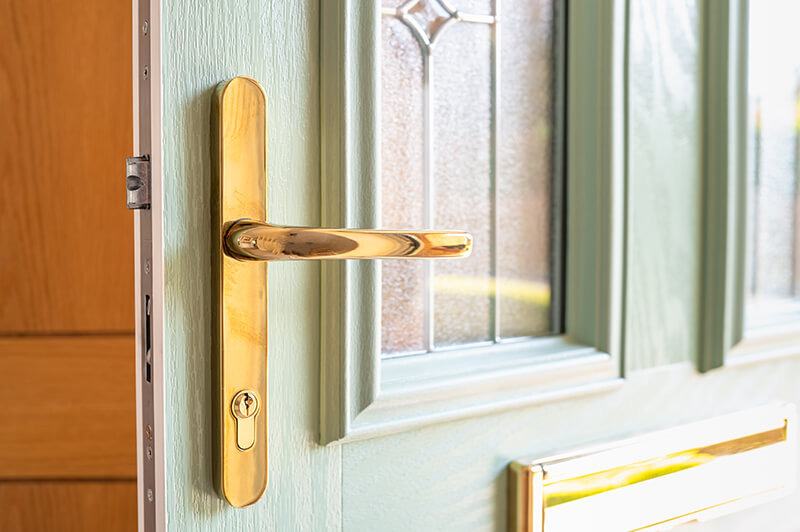
If you're concerned about your carbon footprint, the energy efficiency of a door isn't the only issue to consider.
As far as materials go, a composite door is an all-around sustainable choice. First up, its excellent insulating qualities mean that you use less energy in heating your home. This gives it a significant sustainability win over uPVC doors, and a draw with external wooden doors.
Another factor to consider is the long lifespan a composite door will enjoy. If a new door lasts longer, this makes it a sustainable choice as it won't use up materials for a replacement. Timber doors will last decades but they will need regular refinishing and looking after while uPVC doors have a much-reduced lifespan.
The one sustainability downside of composite doors is that they are hard to recycle. While particular composite door brands can be recycled, not all can thanks to the mix of materials they are made from. It is also difficult to find places that accept them. For many, this will balance out with the other environmentally friendly properties of the door, but it is worth considering.
As the sustainability point above proves, it is impossible to get a completely perfect door material. When you're picking a new front door or back door, it is important to weigh up the disadvantages as well as the benefits.

Perhaps the biggest downside of composite doors is how difficult they are to refinish or paint.
As we've mentioned above, there is an incredible range of designs and composite door styles available but you do need to pick carefully. It is not as easy to change up the look of your composite door to a different colour as it is with other door materials.
This is because of that strong, resistant GRP or plastic-based skin. Its resilience to water, damage and dirt also makes it a hard surface for paint to grip on to. This doesn't mean it is impossible to paint, but it is a difficult job that can easily leave a less attractive result than you started with.
The difficulty isn't the only reason you shouldn't paint composite doors either. If you do decide to paint it, you will lose a lot of the fantastic qualities that make a composite door a great choice.
For example, paint is a lot less durable than a GRP composite door skin. This means that the paint colour is likely to fade a lot quicker than the original skin would. It is also more likely to get damaged or scratched, and it will need more maintenance to keep it looking its best.
When subjected to extreme temperatures, all doors will crack and creak - including a composite door.
This sound is created as the wood and plastic in your composite door expand and then contract as it warms and cools. This is a known behaviour so all front doors are made with this in mind. Though it sounds scary, this expansion shouldn't cause any long-term damage to your door surface or interior.
If you want to minimise this issue, it is recommended not to install dark grey or black doors in south-facing positions as they will absorb a lot of heat. Stick instead to pale or white doors, to reflect heat instead.
Though they may swell and shrink in the sun, a composite door is unlikely to warp as a result of this. This is because they are built to allow for some movement without affecting the door structure too much.
The sun is also unlikely to make the colour of composite doors fade either. Unlike uPVC and wood which can quickly start to lose some of their colour in direct sun, the durability of GRP on composite doors means they should last decades without fading.
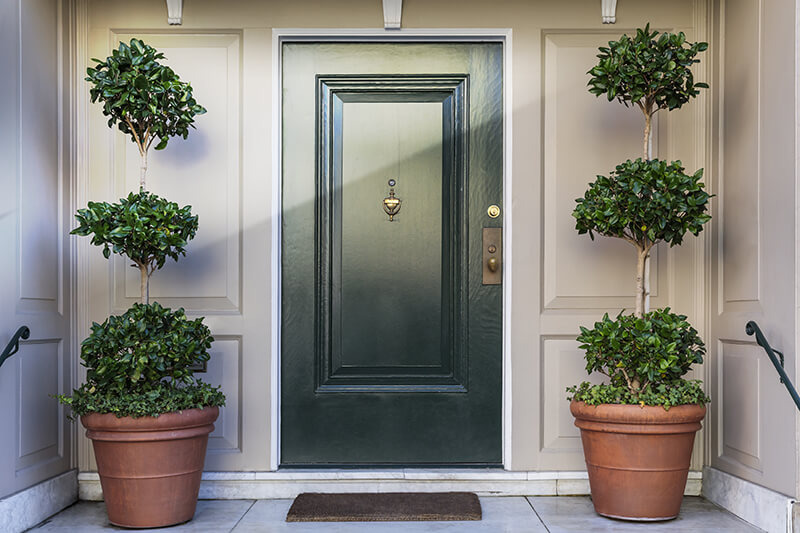
Composite doors are generally among the most expensive on the market but many people feel they are worth every penny.
The thermal efficiency of composite doors makes them a money-saving choice in the long term as they can help keep your heating bills down. They are also so durable that you won't have to spend money replacing them regularly.
Whether they are worth the money will always be a personal choice, but there is plenty to recommend them and suggest that they are.
